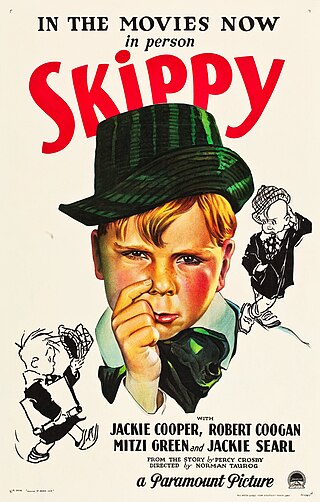
Skippy is a 1931 American pre-Code comedy film based on the popular comic strip and novel Skippy by Percy Crosby. The screenplay was by Joseph L. Mankiewicz, Don Marquis, Norman Z. McLeod, and Sam Mintz.
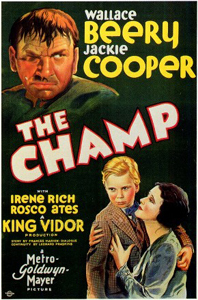
The Champ is a 1931 American pre-Code film starring Wallace Beery and Jackie Cooper and directed by King Vidor from a screenplay by Frances Marion, Leonard Praskins and Wanda Tuchock. The picture tells the story of a washed-up alcoholic boxer (Beery) attempting to put his life back together for the sake of his young son (Cooper).

George Robert Philips McFarland was an American actor most famous for starring as a child as Spanky in Hal Roach's Our Gang series of short-subject comedies of the 1930s and 1940s. The Our Gang shorts were later syndicated to television as The Little Rascals.

Wallace Fitzgerald Beery was an American film and stage actor. He is best known for his portrayal of Bill in Min and Bill (1930) opposite Marie Dressler, as General Director Preysing in Grand Hotel (1932), as the pirate Long John Silver in Treasure Island (1934), as Pancho Villa in Viva Villa! (1934), and his title role in The Champ (1931), for which he won the Academy Award for Best Actor. Beery appeared in some 250 films during a 36-year career. His contract with Metro-Goldwyn-Mayer stipulated in 1932 that he would be paid $1 more than any other contract player at the studio. This made Beery the highest-paid film actor in the world during the early 1930s. He was the brother of actor Noah Beery and uncle of actor Noah Beery Jr.

John Leslie Coogan was an American actor and comedian who began his film career as a child actor in silent films. Coogan's role in Charlie Chaplin's film The Kid (1921) made him one of the first child stars in the history of Hollywood.

Harold Eugene "Hal" Roach Sr. was an American film and television producer, director and screenwriter, who was the founder of the namesake Hal Roach Studios.
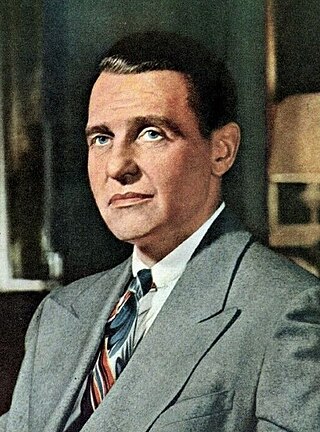
Ralph Rexford Bellamy was an American actor whose career spanned 65 years on stage, film, and television. During his career, he played leading roles as well as supporting roles, garnering acclaim and awards, including a Tony Award for Best Actor in a Play for Sunrise at Campobello as well as Academy Award for Best Supporting Actor nomination for The Awful Truth (1937).

Robert Dean Stockwell was an American actor with a career spanning seven decades. As a child actor under contract to Metro-Goldwyn-Mayer, he appeared in Anchors Aweigh (1945), Song of the Thin Man (1947), The Green Years (1946), Gentleman's Agreement (1947), The Boy with Green Hair (1948), and Kim (1950). As a young adult, he played a lead role in the 1957 Broadway play Compulsion and its 1959 film version; and in 1962 he played Edmund Tyrone in the film version of Long Day's Journey into Night, for which he won two Best Actor Awards at the Cannes Film Festival. He was nominated for a Golden Globe Award for Best Actor – Motion Picture Drama for his starring role in the 1960 film version of D. H. Lawrence's Sons and Lovers.

Allen Clayton Hoskins was an American child actor, who portrayed the character of Farina in 105 Our Gang short films from 1922 to 1931.
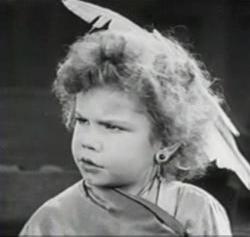
John Michael Condon credited as Jackie Condon was an American child actor who was a regular in the Our Gang short series as an original cast member from 1922 until 1929, during the Hal Roach produced Pathé silent era.
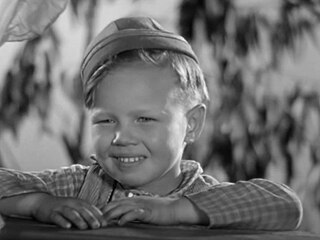
Robert E. Hutchins was an American child actor who was a regular in the Our Gang short subjects series from 1927 to 1933. A native of Tacoma, Washington, he was given the nickname of Wheezer after running around the studios on his first day so much that he began to wheeze.
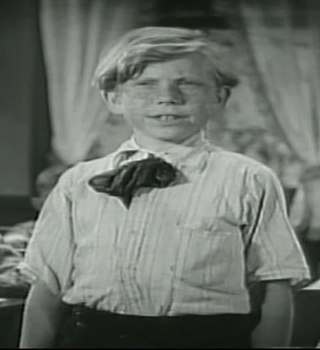
Donald Haines was an American child actor who had recurring appearances in the Our Gang short subjects series from 1930 to 1933. He appeared in Our Gang during the early sound days along with Norman "Chubby" Chaney, Allen "Farina" Hoskins, Jackie Cooper, Matthew "Stymie" Beard, Bobby "Wheezer" Hutchins, and Dorothy DeBorba.

Noah Lindsey Beery was an American actor often specializing in warm, friendly character roles similar to many portrayed by his Oscar-winning uncle, Wallace Beery. Unlike his more famous uncle, however, Beery Jr. seldom broke away from playing supporting roles. Active as an actor in films or television for well over half a century, he was best known for playing James Garner's character's father, Joseph "Rocky" Rockford, in the NBC television series The Rockford Files (1974–1980). His father, Noah Beery, enjoyed a similarly lengthy film career as an extremely prominent supporting actor in major films, although the elder Beery was also frequently a leading man during the silent film era.
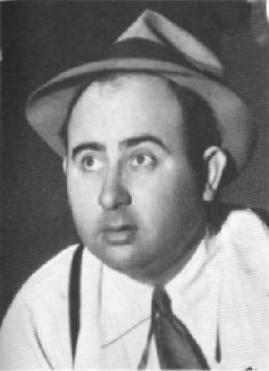
Norman Rae Taurog was an American film director and screenwriter. From 1920 to 1968, Taurog directed 180 films. At the age of 32, he received the Academy Award for Best Director for Skippy (1931), becoming the youngest person to win the award for eight and a half decades until Damien Chazelle won for La La Land in 2017. He was later nominated for Best Director for the film Boys Town (1938). He directed some of the best-known actors of the twentieth century, including his nephew Jackie Cooper, Spencer Tracy, Mickey Rooney, Judy Garland, Deanna Durbin, Fred Astaire, Gene Kelly, Deborah Kerr, Peter Lawford, Dean Martin, Jerry Lewis, Elvis Presley and Vincent Price. Taurog directed six Martin and Lewis films, and nine Elvis Presley films, more than any other director.
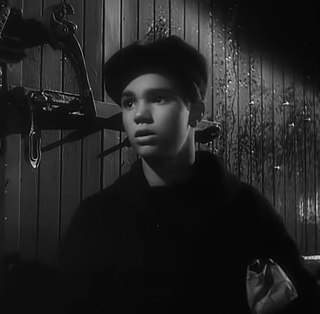
Darryl Gerard Hickman was an American actor, screenwriter, television executive, and acting coach. He started his career as a child actor in the Golden Age of Hollywood and appeared in numerous television serials as an adult, including several episodes of the CBS series The Nanny. He appeared in films such as The Grapes of Wrath (1940) and Leave Her to Heaven (1945).

Our Gang is an American series of comedy short films chronicling a group of poor neighborhood children and their adventures. Created by film producer Hal Roach, also the producer of the Laurel and Hardy films, Our Gang shorts were produced from 1922 to 1944, spanning the silent film and early sound film periods of American cinema. Our Gang is noted for showing children behaving in a relatively natural way; Roach and original director Robert F. McGowan worked to film the unaffected, raw nuances apparent in regular children, rather than have them imitate adult acting styles. The series also broke new ground by portraying white and black children interacting as equals during the Jim Crow era of racial segregation in the United States.

George Vincent Homeier, known professionally as Skip Homeier, was an American actor who started his career at the age of eleven and became a child star.

John E. Searl was an American actor. He portrayed bratty kids in several films, and often had only small roles, such as "Robin Figg" in 1934's Strictly Dynamite.

Robert Coogan was an American film and television actor.

Sooky is a 1931 American pre-Code adventure film directed by Norman Taurog and written by Joseph L. Mankiewicz, Norman Z. McLeod and Sam Mintz. It is a sequel to the 1931 film Skippy. The film stars Jackie Cooper, Robert Coogan, Jackie Searl, Willard Robertson, Enid Bennett and Helen Jerome Eddy. It was released on December 26, 1931, by Paramount Pictures.

























